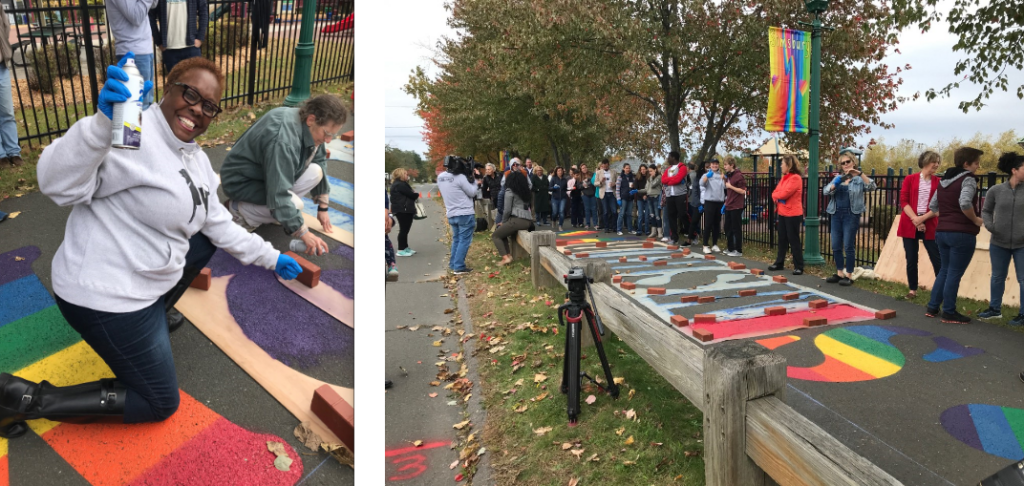Before George Floyd.
Before Breonna Taylor.
Before Ahmaud Arbery.
Before Elijah McClain.
Before such devastating and horrific acts of violent racism and police misconduct renewed a sense of urgency for justice for Black lives, Sustainable CT has recognized the critical importance of anti-racism work at the municipal level since its inception in 2017.
In my time with Sustainable CT, I’ve learned of the figurative cogs that drive municipal sustainability and of the literal COGs (Councils of Governments) that group towns and cities as counties would.
In my efforts to develop new sustainability-centered actions for the certification program, I’ve recognized that the heart of our goals are not only environment- but equally people-centered–embracing uniqueness, trailblazing for diversity, and creating opportunities for connectivity. In joining such an empowering and inclusive organization, I’ve been given the space to recognize that sustainability efforts of any kind are only possible when approached through an equity lens.
Turning actions into action
As a certification program with 110 registered municipalities out of 169 in the state, Sustainable CT uses their broad definition of sustainability to demonstrate the interconnectedness of environmental and racial justice.
The certification program is home to 9 action categories, constructed through a careful process of collaboration and co-creation, from which participating municipalities must complete at least one action per category to gain points towards certification. Which actions towns choose to implement is based on each community’s specific capacities, needs and interests, yet there is one standalone action that is mandatory for certification: Optimize for Equity, with its accompanying Equity Toolkit.

The mandatory nature of this action instantly put me into the mindset of the organization: to achieve sustainability, there must be an inclusive process of co-creation that works for all members of a community.
To help towns streamline equity efforts, Sustainable CT offers free equity coaches to help municipalities lay out a process for applying the Equity Toolkit and to identify how to build an inclusive process, who lives and works in their municipality, and how to co-create with community members to produce outcomes that balance everyone’s needs.
Because for Sustainable CT, equity is not negotiable.
Our equity action has catalyzed some fruitful discussions on implicit segregation in municipalities and important steps toward greater justice. For instance, the town of Mansfield applied the Equity Toolkit to Sustainable CT action 4.4: Assess Climate Vulnerability by performing an assessment with special consideration to residents of lower income and communities of color. Additionally, through an inclusive process, the town of Simsbury created a Rainbow Walk as a gathering place to celebrate and commemorate the town’s diversity.
Cultivating a culture of anti-racism from within
Connecticut municipalities are not the only ones benefiting from the program’s equity-centeredness. One of my richest experiences in this internship has been attending our Equity Shared Learning sessions, in which all of us Sustainable CT staff meet bi-weekly to share what we have learned from that week’s assigned readings, podcasts, or videos, all centered around the roots of racism and how we can further promote racial justice.

In addition, we staff and leaders from participating municipalities gather periodically for more broadly offered equity trainings on belonging, diversity and inclusion. That learning is facilitated by a partnering organization and tailored for Sustainable CT, consisting of weekly classes over a month and multiple opportunities for training throughout the year. Participating in these classrooms has provided me a safe, inclusive space for trust and openness, as each class embraces voices and experiences while teaching everyday anti-racism.
Justice can never be accomplished alone. Beginning in the summer of 2020, over 200 stakeholders (including myself and other folks from Sustainable CT) convened to plan a new initiative, now named Desegregate CT, to address the state’s long history of segregated zoning and redlining. The effort complements and builds off of the success of many additional partner organizations, who have long worked to address segregation.
Equity, inclusion, and anti-racism have always been at the forefront of Sustainable CT’s mission. With an ever-growing membership and scope of impact, and upon the revitalization of the historic Black Lives Matter movement, racial justice efforts are only increasing for Sustainable CT, its staff, and its participating communities.
If not for the internship requirement in pursuit of my Master of Science in Environmental Policy degree from Bard College’s Center for Environmental Policy, I would not have gained such a revitalized sense of responsibility and urgency to address environmental sustainability and racial justice in concert with one another.

